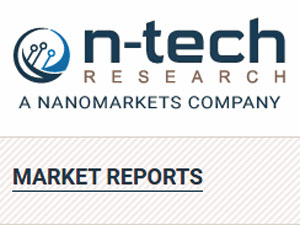
 The market for smart antimicrobial coatings and surfaces will reach about US$1.3 billion by 2020, according to a recently released report by US industry analyst firm n-tech Research. The report is titled ‘Markets for Smart Antimicrobial Coatings and Surfaces – 2015 to 2022’.
The market for smart antimicrobial coatings and surfaces will reach about US$1.3 billion by 2020, according to a recently released report by US industry analyst firm n-tech Research. The report is titled ‘Markets for Smart Antimicrobial Coatings and Surfaces – 2015 to 2022’.
As drug-resistant microbes and hospital acquired infections (HAIs) continue to spread, smart materials are being used to combat them. This report quantifies the market for these ‘smart antimicrobials’, which include antimicrobial peptides, smart polymers, silver preparations and super-hydrophobic preparations. It also covers multifunctional materials that combine antimicrobial action with self-cleaning and self-healing capabilities.
The report provides eight-year revenue forecasts for smart antimicrobials coatings and surfaces, with breakouts by material type and application. Medical applications include implants, surgical tools, medical facility surfaces, medical uniforms and general medical equipment. Non-medical applications comprise clothing and textiles, consumer products, the food supply chain, buildings and construction, automotive and military.
It also discusses the business models currently being employed by firms in the self-healing materials space, as well those which n-tech thinks will enter this space in the next few years.
Companies discussed in this report include Aeris, AK Coatings, Allied Biosicence, Applied Sciences, BASF, BigSky Technologies, Bio-Gate, BioSuMa, BioTech International, BlueSky, Clariant, Corning, DiFusion Technologies, Dow Chemical, DSM Biomedical, Dunmore, DuPont, Evonik, FlowCrete, Gelest, Green Earth Nano Science, Johnson Controls, Less EMF, Life Material Technology, Microban, Nolla, Optical Coatings Technologies, Parker Hannefin, Parx Plastics, Plastics Color, Polygeine, Poly One, PPG, Ras Materials, Rochling, SABIC, Sciessent, Sharklet Technologies, Specialty Coatings Systems, TiFiber and Vesteagen.
More effective smart antimicrobials
Today, smart antimicrobials are dominated by silver-based materials, although some smart antimicrobials based on photosynthesis are also widely available.
The silver-based smart antimicrobials market will continue to grow, reaching US$913 million by 2020, but will be hurt by the appearance of more effective smart antimicrobials such as peptides as well as environmental concerns about silver itself.
There will also be a strong trend towards combining smart antimicrobials with additional self-cleaning and self-healing functionality. Self-cleaning adds to the antimicrobial effect by washing away microbes while self-repair of cracks gives microbes no place to hide. By 2020 smart multifunctional coatings and surfaces are expected to generate some US$120 million.
Sales of smart antimicrobials will focus on medical equipment and medical uniforms. Growing the market for smart antimicrobials into non-healthcare markets will be a challenge; life and death concerns will be hard to evoke as part of a business case.
However, n-tech still sees important niches outside of medical markets where smart antimicrobials are likely to sell well. These include high-use and high-traffic areas in buildings, and clothing and textiles. The interior surfaces of cars, truck, aircraft and marine vessels present additional opportunities for smart antimicrobial surfaces.
Details about the report, including a downloadable excerpt are available at this site.